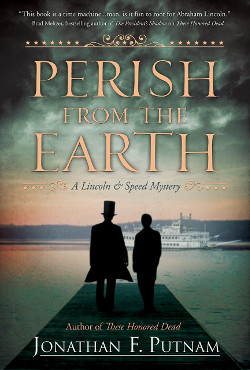 Perish from the Earth by Jonathan F. Putnam—the second Lincoln & Speed mystery—is meticulously researched and deftly plotted, revolving around a true historical murder that, while nearly forgotten today, was one of the most infamous crimes of the nineteenth century and played a key role in driving the nation toward civil war (available July 11, 2017).
Perish from the Earth by Jonathan F. Putnam—the second Lincoln & Speed mystery—is meticulously researched and deftly plotted, revolving around a true historical murder that, while nearly forgotten today, was one of the most infamous crimes of the nineteenth century and played a key role in driving the nation toward civil war (available July 11, 2017).
Read an excerpt from Perish from the Earth!
In an odd bit of coincidence, the fate of Elijah Lovejoy in Alton, Illinois, in 1837 has come up three times for me this week. The first, during a visit to a museum in Springfield, Massachusetts, which was a center of abolitionist activity in the 1830s. The second, in an article written about modern violence against journalists. The third was in this book, Perish From the Earth by Jonathan F. Putman, where Lovejoy is a supporting character.
Perish is set in and around Alton in 1837. The practice of slavery is an ever-present Sword of Damocles poised to strike down its citizens, slave owners and abolitionists in equal measure. It’s not yet come to a boiling point at the beginning of the story, but the cracks in America are visible, a chasm as wide as the Mississippi itself.
The inciting murder, however, initially seems to have little to do with the nation’s “peculiar institution.” A young, ostensibly well-bred gentleman is murdered on a Mississippi riverboat. Lincoln takes on the defense of a painter/illustrator who is arrested for the crime, as the victim was a rival for the romantic affections of the daughter of a plantation owner.
The trial is set for a month later by the judge riding the Illinois circuit along with numerous lawyers of the time, including Lincoln. Since the murder allegedly took place on a riverboat that Speed’s father owns, he’s tabbed to do the investigating while Lincoln rides the circuit. This, in effect, makes Speed the lead character of this story despite Lincoln’s equal billing. Instead, Lincoln becomes someone who drops in and out of the narrative with bits of wisdom and humor, much like Sherlock Holmes does in Laurie King’s Mary Russell novels, as in this passage about mob rule:
“No matter the crime, we can’t substitute the furious passions of the mob for the sober judgement of the courts. We are a nation of laws and must remain so. If men take it into their heads to burn murderers today, they’ll be as likely to burn innocent men tomorrow. And if the government cannot protect its people from the rule of the mob, the government itself will be disregarded before long.”
Speed carrying the narrative works as he’s an amiable Watson, and the setting provides a colorful cast of characters (even Robert E. Lee provides a blink-and-you’ll-miss-it cameo). It soon becomes apparent that the real mystery is not so much who killed the victim but what events on the riverboat led to the murder.
Nothing and no one is as it initially appears in this story. Motives and tempers hide under a deceptive surface, from the Captain of the boat to the local elderly gossip to the two gamblers—one from the boat, one from on land—who become bitter rivals. (Putman based the riverboat gambler on yet another real-life person.) The feud between the two gamblers over a card game provides one of the courtroom highlights of the book, showcasing Lincoln’s trademark humor and intelligence.
But events soon become chilling as Speed visits the Southern plantation where the owner, his son, and his slave overseer have installed a brutal regime. The daughter, much in love with the illustrator, is terrified to hear of her intended’s arrest and becomes an ally for Speed. The searing violence in this section, while obviously portrayed as wrong and evil, may be triggering for some readers.
If the narrative has a fault, it’s that Speed sometimes seems too naïve about what’s happening around him. His younger sister, Mary, who’s barged her way into helping solve the mystery, seems to have a clearer grasp on the realities of the day and a more forceful personality to the point where I wanted her to be the narrator.
Still, as the case comes closer to trial and secrets come into the open, the ire of citizens toward Lovejoy’s Abolitionist newspaper comes to a head, and neither Speed nor Mary can predict the level of violence that follows. Lincoln arrives in the aftermath of this violence for the climatic trial, and he is key to the final courtroom confrontation that ends the book—a conclusion that is bittersweet for Mary, Speed, and Lincoln.
In all, the book is meticulously researched—as evidenced from the beginning with a scene on the riverboat—firmly rooted in its time and place, and manages to create a whole cast and story that seems real and never contrived despite the concept of Lincoln as co-lead in a mystery series.
For those interested in mysteries, the time period, or a younger Lincoln, I’d highly recommend both of Putman’s books in the series.
To learn more or order a copy, visit:
opens in a new window![]() opens in a new window
opens in a new window![]()
Corrina Lawson is a writer, mom, geek and superhero, though not always all four on the same day. She is a senior editor of the GeekMom blog at Wired and the author of a superhero romance series and an alternate history series featuring Romans and Vikings in ancient North America. She has been a comic book geek all her life and often dreamed of growing up to be Lois Lane.

This was not the first time Mr Modi had talked about gender equality and respect for women.